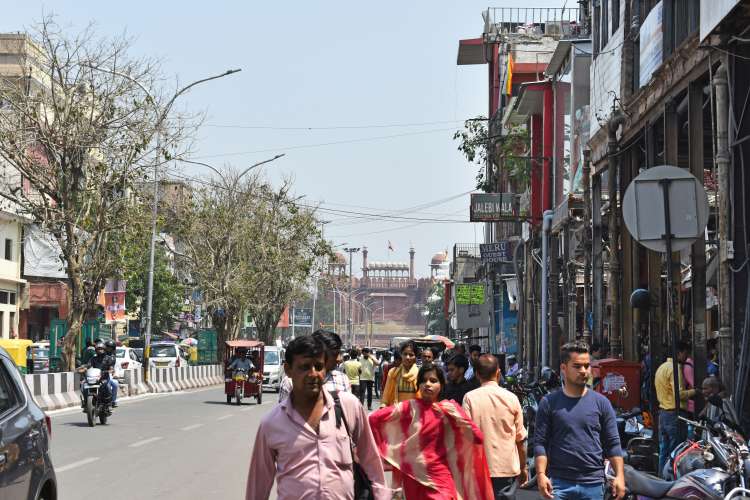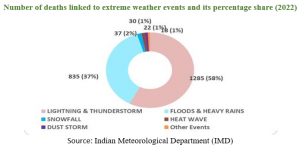
Climate change has emerged as the primary global health threat, and India is particularly vulnerable to its health-related impact. The country has witnessed a surge in health issues and diseases directly linked to climate hazards. Notably, extreme heat events, such as the record-breaking summers of 2016 and 2022, have severely disrupted healthcare services, leading to an increase in respiratory and cardiovascular diseases, heat-related illnesses, and dehydration.
The altered climate patterns, characterised by irregular rainfall and drought conditions in various regions of India, have led to an uptick in vector-borne diseases. Furthermore, diarrhea, identified as the third most prevalent climate-induced disease, is a leading cause of mortality among children under five, according to the National Family Health Survey. The frequency of extreme weather events has also caused significant disruptions and instability within the healthcare delivery system.
READ | Protest to mutual gain: Reforms must factor in hidden costs of contract farming
The effects of climate change have been deadly, resulting in numerous fatalities and displacing millions due to cyclones, floods, and droughts. The Global Climate Risk Index 2021 estimated the absolute losses from climate change impacts for India at $68.6 billion in PPP terms, accounting for 0.72% of India’s GDP. These enormous climate-induced health costs place a significant strain on healthcare facilities.
Climate change impact on health, economy
The extensive health costs incurred from climate change not only disrupt agricultural and economic activities, but also jeopardise livelihoods. Rising temperature exacerbates heatwaves, putting additional pressure on healthcare services and facilitating the spread of infections. India’s vulnerability to extreme weather events further exacerbates challenges, leading to injuries, displacement, and waterborne diseases.
According to the United Nations, nearly 600 disasters over the past five decades have claimed 138,377 lives in India. The World Meteorological Department highlighted that two million people died and $4.3 trillion in economic damage occurred during the same period due to extreme weather events.
Number of deaths linked to extreme weather events

The Reserve Bank of India’s recent report indicated that up to 4.5% of India’s GDP could be at risk by 2030 due to lost labour hours from extreme heat and humidity. This threat spans multiple sectors, affecting agriculture, industry, and services, resulting in increased costs, reduced profits, and potential relocations.
Industries are grappling with increased operational costs and reduced profits, while the service sector faces financial pressures, rising insurance claims, and disruptions in travel and hospitality. Additionally, health hazards in the labour market lead to productivity losses and migration.
Challenges to universal health coverage
Despite Indian policies acknowledging the impact of climate on health, their implementation lacks in establishing climate-resilient health systems. The National Action Plan on Climate Change (NAPCC) recognises the potential health impacts of climate but needs a stronger emphasis on enhancing primary, secondary, and tertiary healthcare facilities.
India’s ambition to achieve Universal Health Coverage by 2030 is hindered by accessibility issues to quality and affordable primary healthcare. The National Health Mission (NHM) has shifted focus towards the social determinants of health, promoting a health system anchored in primary care.
Although policy measures like the Ayushman Bharat health centers have marked progress, India’s UHC service index score of 47 remains insufficient for effective coverage. This raises critical questions about how national policies can be revised to prioritise investments in climate-resilient health infrastructure and how the NAPCC can be strengthened to specifically focus on constructing health systems resilient to climate impacts, thus achieving UHC.
To shield healthcare from the ravages of climate change, strategic investments in resilient infrastructure are vital, ensuring that facilities can withstand extreme weather. Early warning systems, vector control programmes, public awareness campaigns, research on changing disease patterns, improvements in water and sanitation, climate-adaptive agriculture, air quality policies, and cross-sectoral collaboration are imperative. Engaging communities, integrating policies, building capacities, and international cooperation are key to a holistic response to climate-related health threats.
With climate change posing an unprecedented challenge to health systems, India urgently needs to bolster its healthcare infrastructure to be resilient, low-carbon, and sustainable. Delaying action risks overwhelming health systems with the impacts of climate change.
(Suresh P Singh is Senior Director, VeKommunicate, a public policy research and advocacy organisation. Dr Md Mashhood Alam is Senior Research Associate, BRCG Research & Development Foundation. Views are personal)
